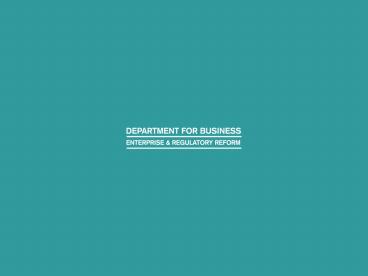Service Standards for Consumers The Legislative Framework - PowerPoint PPT Presentation
1 / 12
Title:
Service Standards for Consumers The Legislative Framework
Description:
CONSUMER PROTECTION FROM UNFAIR TRADING REGULATIONS. Better Regulation in a consumer context ... CONSUMER PROTECTION FROM UNFAIR TRADING REGULATIONS. Example 1 - CPRs ... – PowerPoint PPT presentation
Number of Views:31
Avg rating:3.0/5.0
Title: Service Standards for Consumers The Legislative Framework
1
(No Transcript)
2
Service Standards for Consumers The Legislative
Framework
- Graham Branton - BERR
3
Better Regulation in a consumer context
- Simpler but wider law principles-based
- Fewer prescriptive and specific obligations
- More self regulation and ADR focus on industry
best practice - Ensure systems for complaint handling more
analysis of consumer detriment - More predictable enforcement based on consumer
detriment information
4
Example 1 - CPRs
- Repeals detailed provisions in 23 laws
- Introduces general principles
- Removes specific obligations e.g.
- Prescriptive rules about how information has to
be given (eg in writing) and, in certain cases
where it must be displayed, are being abolished. - Businesses are no longer obliged to follow the
guidance in the new Pricing Practices Guide
provided their price indications are not
misleading. - Certain advertisements for special offers will no
longer have to give the end date of the offer. - Hotels will no longer be required to display room
prices in a prominent position in the reception
area - Restaurants will no longer have to comply with
very detailed rules as to the content of menus
and where they must be displayed.
5
CPRs (2)
- General prohibition on unfair commercial
practices (a general duty not to trade
unfairly) - Prohibition on misleading practices (actions and
omissions) - Prohibition of aggressive practices
- Prohibition of practices contrary to the
requirements of professional diligence - There must be consumer detriment - except for 31
banned practices in Annex (e.g. claiming to be
signatory to Code of Conduct when not)
6
Conduct effect
Conduct only
7
CPRs (3)
- Concept of average versus vulnerable consumer
to determine consumer detriment - Enforcement through criminal and civil law by
Trading Standards and OFT also established
means - Impact of RES bill on enforcement
- Law Commission looking at private enforcement
through claims for damages
8
Example 2 - CEAR
- Oblige energy and postal businesses to belong to
a redress scheme for complaint resolution - Enable energy and postal regulators to fix
binding complaint-handling standards - Require estate agents to sign up to an ombudsman
scheme c.f. consumer credit - New powers for OFT to investigate estate agent
activity if necessary
9
Wider European vision
- UCPD can be seen as one half of a future European
Consumer Code - The missing half would be rules to define
consumer rights this will be addressed in the
review of the consumer acquis - EU law would be generalised and set a framework
across all sectors. It would be largely
future-proof. - Enforcement would be co-ordinated across Europe,
independently administered and focused on
evolving consumer threats. It could be adjusted
by sector to areas of greater consumer risk,
informed by market analysis major role for
self-regulation and industry standards. - No need for new legislation to respond to each
new consumer detriment. - Large swathes of existing domestic and some
European law could be repealed. Consumers would
understand their rights much better and have more
confidence to shop across borders. Businesses
would face similar law and similar enforcement
practice across entire EU.
10
Domestic Vision - Consumer Law Review
- Our vision is a simpler and more flexible regime,
which is easier for business and consumers to
understand and to use and where - the main elements of consumer law are set out
clearly in a small number of principles - better and more targeted information enables
consumers to make effective choices, and doesnt
impose unnecessary costs on them and on
businesses - constructive resolution of disputes is achieved
through appropriate tools and incentives making
it easier for consumers to get redress but, at
the same time, reducing the burdens on business,
and - risk-based enforcement focuses attention on rogue
traders wherever they operate, not on routine
inspections
11
Consumer Law Review (2)
- Main focus on 3 elements
- Simplification of Law e.g. supply of goods and
services, weights and measures, consumer credit - Empowerment of consumers and redress includes
complaints mechanisms, ADRs and consumer rights
to compensation - Compliance and enforcement impact of RES,
predictability and consistency, internet
12
Implications for Standards
- Government preference for self regulation, is
likely to continue - Principle-based legislation links naturally to
the elaboration of sector-specific codes of
practice to apply principles to sectoral
specificities - Attempts to analyse consumer detriment will put
pressure on sectors with low satisfaction to
develop consumer-friendly initiatives - CPRs will force enforcers to identify what
constitutes professional diligence































